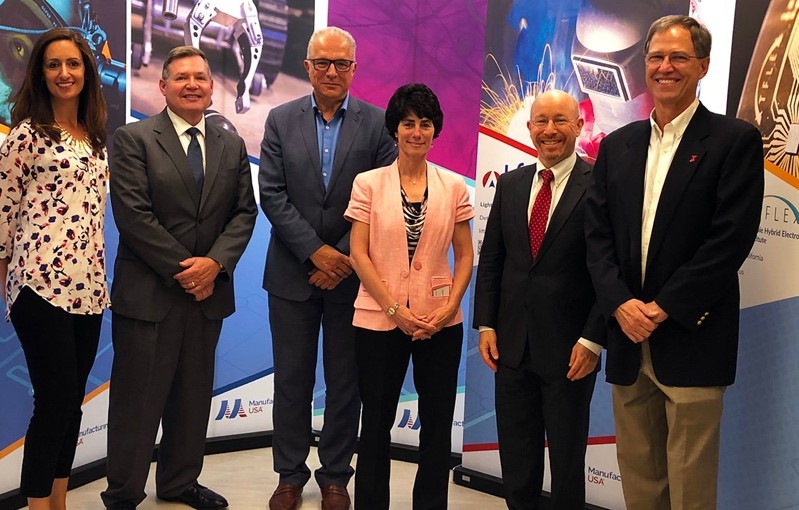A Worcester Polytechnic Institute (WPI) team visited the NIST headquarters of the Advanced Manufacturing National Program Office and shared their incredible history and journey. WPI is a member of eight of the 14 Manufacturing USA® institutes, making it a crucial educational leader and force in the national mission of Manufacturing USA to enhance industrial competitiveness and economic growth and strengthen our national security by ensuring U.S. global leadership in advanced manufacturing. WPI has fully embraced the Manufacturing USA approach of connecting people, ideas, and technology to solve industry-related advanced manufacturing challenges.

Left to right: Zara Brunner, Mike Molnar, Bogdan Vernescu, Ellen Grant Piccioli, Robert Rudnitsky, Frank Gayle
How Industry Created its Workforce
Back in 1865, John Boynton and Ichabod Washburn, industrialists in central Massachusetts, each had his own dream of creating a new approach to education to prepare a scientifically trained workforce to drive the industrial revolution and make a positive impact on society. They wanted to prepare a new professional class of engineers, scientists, and entrepreneurs who could solve challenges for the community. When their visions were brought together, WPI was born.
Well into the 21st century, this need still exists and is as widespread as ever. According to studies by Deloitte and the Manufacturing Institute, nearly 3.5 million manufacturing jobs will be needed over the next decade. We know that technology is having a profound impact on manufacturing, and that the skills and training needed all combine to create a universal challenge for industry: to build a talent pipeline to fill the millions of high-paying, rewarding manufacturing careers necessary to sustain our future.
Leveraging Manufacturing Technology to Make an Impact
Today, WPI has 14 academic departments offering more than 50 degrees focused around its founding mission to provide an education that balances theory with practice. Hands-on, project- based learning is at the core of how WPI teaches its students.
It’s clear that the WPI model generates results for its students. For example, The Wall Street Journal (Times Higher Education) ranked WPI #1 for faculty that best combine research and teaching, 100% of students receive a global project scholarship as of the class of 2022, and WPI is included in the U.S. News & World Report list of the top 100 national universities. Additionally, the National Academy of Engineering awarded WPI the 2016 Bernard M. Gordon Prize for Innovation in Engineering and Technology Education.
WPI has leveraged its involvement with the Manufacturing USA institutes as a way to rebuild a manufacturing hub in Central Massachusetts. To guide them in this work, WPI recently hired Ellen Grant Piccioli, its first director of manufacturing innovation. More information about WPI’s initiative can be found here. Below is a brief look at what WPI is doing with Manufacturing USA institutes.
Integrated Photonics Manufacturing (AIM Photonics institute): WPI is advancing the technology involved in integrating electronics and photonics through its Lab for Education & Application Prototypes (LEAP) in Central Massachusetts.
Advanced Robotics Manufacturing (ARM institute): WPI was the first in the nation to offer a bachelor of science program in robotics engineering. Researchers are designing innovative ways to deploy robotics in manufacturing industries.
Regenerative Medicine Manufacturing (BioFabUSA institute): Biomedical engineering researchers are leaders in the emerging field of regenerative manufacturing. Dean Kamen, who created FIRST Robotics and is a nationally renowned innovator, is the executive director of BioFabUSA and also a WPI alumnus. WPI President Laurie Leshin is on the Board of Directors for BioFabUSA.
Clean Energy Smart Manufacturing (CESMII institute): WPI researchers from different departments and disciplines are developing advanced micro-sensors, controls, and algorithms for smart manufacturing applications..
Lightweight Metals Manufacturing (LIFT institute): WPI’s Metal Processing Institute leads the metal casting efforts of LIFT, with innovations in energy-saving lightweight and modern materials.
Biopharmaceutical Manufacturing (NIIMBL institute): WPI’s Biomanufacturing Education and Training Center and its biomedical engineering program partner with NIIMBL for workforce development training and research in biopharma manufacturing.
Process Intensification Manufacturing (RAPID institute): Through several research centers, WPI is working with RAPID to advance modular process intensification, which they believe will have a profound impact on U.S. manufacturing capabilities.
Sustainable Manufacturing (ReMADE institute): WPI’s Center for Resource Recovery and Recycling works with ReMADE on the challenges of sustainable manufacturing in food and other agricultural products, forestry, chemical, textile, and biopharmaceutical products.
What’s Ahead
As the nation transforms once again and advanced manufacturing takes hold across the industry, new ecosystems are being built. These innovation communities leverage and shape the economy and workforce of the future, enable new products and solutions, and make profound contributions to local communities and the U.S. as a whole. In the spirit of its founders, WPI is collaborating with Manufacturing USA institutes and state partners to create such an advanced manufacturing hub in Central Massachusetts.

